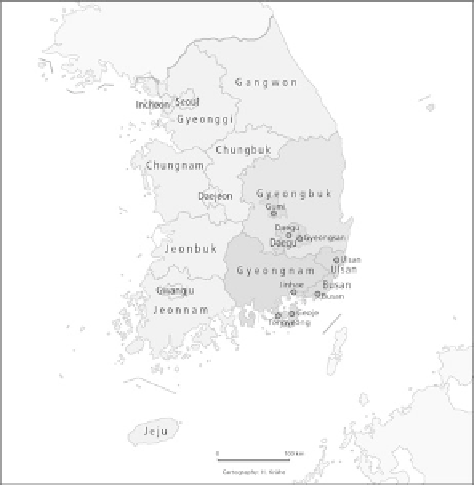Geography Reference
In-Depth Information
Figure 21
.
3
Location of Gyeongnam and Daegu in South Korea
in Ulsan (Hyundai Heavy Industries) and Geoje (Daewoo and Samsung); other large
yards can be found in Ulsan (Hyundai Mipo), Busan (Hanjin) and Jinhae (STX).
Both academics and the popular press in Europe are very much focused on the role
of the central government in subsidizing Korea's shipbuilding industry, as an explana-
tion for its success. The industry, however, has developed from a couple of cathedrals
in the desert, highly dependent on import for its main supply, towards an innovative
cluster with much interaction between the large yards and their suppliers, as well as with
universities and research institutes (Hassink and Shin, 2005b). The production complex
developed from simple co-location enforced by central government and favoured by
the natural physical conditions in the area, as well as favouritism by political leaders of
central government, to a full l edged cluster, with strong competition, collaboration and
policy support at central level. Until recently, local and regional governments played a
minimal role in supporting the cluster.
Presently, the shipbuilding cluster, which mastered the i nancial crisis in 1998
remarkably well, is enabling regional growth. However, the growth-enabling lock-in
in Gyeongnam might turn into a constraining one in the future, if external conditions
negatively af ect the cluster and at the same time lock-ins hinder the ability of the cluster
to react to the changing conditions. Among these changing conditions are the conl icts
with the European Union on unfair competition, the expected cyclical downturn in the
industry because of over-capacity combined with the increasing competitiveness of low-
cost shipbuilder China, which might increasingly make shipbuilding in South Korea a
vulnerable industry and which might turn the cluster from a mature into a declining one.
Potential lock-ins might occur because of the common worldview shared by the main
actors in the industry that China is not yet a threat (cognitive lock-in), and because of the


